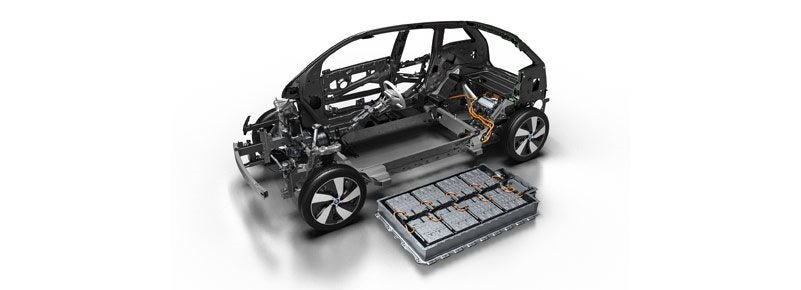
BMW i3 Batteries Used for Home Energy Storage
As part of their ongoing commitment to alternative energy and helping to create a more sustainable solution to our power needs, BMW has announced an innovative new program. At a June symposium in Montreal focused on electric vehicles, the German carmaker announced their entry into the home energy market with systems that use batteries found in the all-electric BMW i3. This home energy storage system can provide up to 22 or 33-kWh of energy storage for use during peak periods or during blackouts. For reference, average daily household electricity consumption in the U.S. is between 15 and 30-kWh.
Where other similar concepts from companies like Tesla use a different energy storage configuration than their vehicles use, the BMW system uses exactly the same battery pack as in the i3. It is also intended to use the same charging system as the i3 uses. By using both the same battery pack and the same charging setup, costs can be reduced and may result in better overall efficiencies and return on investment.
Solving Two Challenges at Once
Since the rollout of the BMW i3 in the U.S. in 2014, there have been nearly 20,000 of the all-electric cars sold in this country. Worldwide, there are more than 45,000 BMW i3 vehicles on the roads. While this is a step in the right direction from a clean energy perspective, it also creates another problem that BMW wanted to address. The batteries used in electric vehicles are comprised of materials that are harmful to the environment if not disposed of properly and recycled. This is problem number one.
Problem number two of course, is the use of fossil fuels in creating the electricity all of us use on a daily basis. With the new BMW i3 energy storage system, it is hoped that both problems can be addressed at the same time. While the home-based systems that are being installed now are using new battery packs, it is hoped that future installations will use recycled or “second-life” battery packs. That’s because when batteries no longer work for the high-demand usage in vehicles, they still have enough capacity to be used as storage in homes. These home energy storage systems can reduce the amount of energy we use if they are charged using clean energy sources like solar or wind power.
Extending the Renewable Energy Reach
In addition to providing this source of backup power to consumers, BMW is also partnering with solar installation companies to offer customers discounts for the installation of solar panels. This incentive to install solar power for battery charging will extend the renewable energy reach, in addition to saving customer money on their electricity bills.
Finally, the new energy storage units from BMW are also equipped with specialized software that helps determine the best times to charge or discharge the system. In this way, consumers can charge their energy storage systems at the optimal time of day, whether they’re using solar or grid power, and can use the power stored there when it is most valuable. This complete consideration of the energy lifecycle is just one more way BMW is helping to make energy consumption more sustainable.
Here at BMW of Louisville, we’re proud to be affiliated with a company that cares so much about the future of our energy consumption. We offer the BMW i3 all-electric car for folks who care just as much about their energy footprint. Stop by and see what the new i3 looks like, and ask us any questions about it you want. We hope to see you soon.